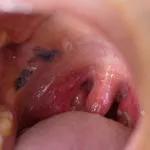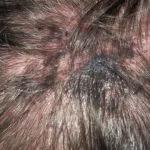See where the deadliest skin cancer can develop
Think melanoma strikes only the typical sun-exposed areas of your skin? This deadly cancer can surface in surprising places, says dermatologist Christine Poblete-Lopez, MD:
Advertisement
Cleveland Clinic is a non-profit academic medical center. Advertising on our site helps support our mission. We do not endorse non-Cleveland Clinic products or services. Policy
Melanoma arises from melanocytes (cells that give us pigment). They are everywhere you’ve got skin. So, although it’s rare, melanoma can develop in your belly button, armpits and groin.

Image content: This image is available to view online.
View image online (https://assets.clevelandclinic.org/transform/a04d7285-5cfb-4933-957a-2ab7d2e9ed0d/Navel-Melanoma-150x150_jpg)
Yes, you also have melanocytes in your nail beds, feet and hands. Melanomas in these areas are more aggressive, likely due to a delay in diagnosis. They are more common among Asians and African-Americans.

Image content: This image is available to view online.
View image online (https://assets.clevelandclinic.org/transform/a1283a0c-a4ac-4843-baa6-5aa9c029e344/Nail-Melanoma-150x150_jpg)
Melanocytes also inhabit the colored iris of your eye, and you can develop melanoma there. When anyone develops melanoma, routine eye checks are as vital as skin checks.

Image content: This image is available to view online.
View image online (https://assets.clevelandclinic.org/transform/7dfaa07b-014e-40f2-b540-574d4dca1bf0/Eye-Melanoma-150x150_jpg)
It’s rare, but melanomas can develop in your body’s mucous membranes. These line your mouth, throat, genitalia, urinary tract, anus and rectum.

Image content: This image is available to view online.
View image online (https://assets.clevelandclinic.org/transform/1ca9473b-a8f6-4c40-aacb-afa28ec7624b/Oral-Melanoma-150x150_jpg)
A full head of hair helps protect your scalp from the sun. But once hair starts to thin, melanoma can develop there, especially on the crown of the head.

Image content: This image is available to view online.
View image online (https://assets.clevelandclinic.org/transform/84fe0d2f-bf50-4e38-a875-e4d11be41811/Scalp-Melanoma-150x150_jpg)
You can’t blame melanoma entirely on the sun’s ultraviolet rays. Genetics also play a role. Multiple sunburns and exposure to tanning beds also increase your risk.

Image content: This image is available to view online.
View image online (https://assets.clevelandclinic.org/transform/73dd47eb-7c89-48e0-acd7-641e471e163a/tanning-bed-150x150_jpg)
Apply sunscreen daily, just like you brush your teeth. Reapply it when going outdoors. For full protection, you should also wear sun-protective clothing, seek shade, and avoid direct sun between 10 a.m. and 3 p.m. (You can get vitamin D from supplements.)
Advertisement

Image content: This image is available to view online.
View image online (https://assets.clevelandclinic.org/transform/111c7137-cfa1-4aac-8321-5b159b76d369/sunscreen-lotion-150x150_jpg)
Advertisement

Sign up for our Health Essentials emails for expert guidance on nutrition, fitness, sleep, skin care and more.
Learn more about our editorial process.
Advertisement
The likelihood of melanoma returning varies by stage, but you can take steps to help prevent recurrence by wearing sunscreen and monitoring your moles
Eczema triggers are different for everyone, but there are some common ways to manage flare-ups, like using a humidifier and fragrance-free creams
Over-the-counter antifungal creams usually get the job done, but it’s important to keep it from spreading in the meantime
Although it could be used as a moisturizer, this new trend is not recommended
The popular skin care ingredient can help smooth, brighten and strengthen your skin
It’s a great disinfectant for around your home, but not for your skin
Changes in texture, smell, color and performance are signs it’s time to throw the cosmetic item away
Follow the 4Cs — cooling, cleaning, covering and comforting — to start the healing process
Prioritize your health by managing stress, strengthening your social connections and getting quality sleep
Bolsters, blankets, pillows and blocks can offer extra support, stability and comfort
Allergies, postnasal drip, asthma or reflux could be to blame for a cough that won’t quit